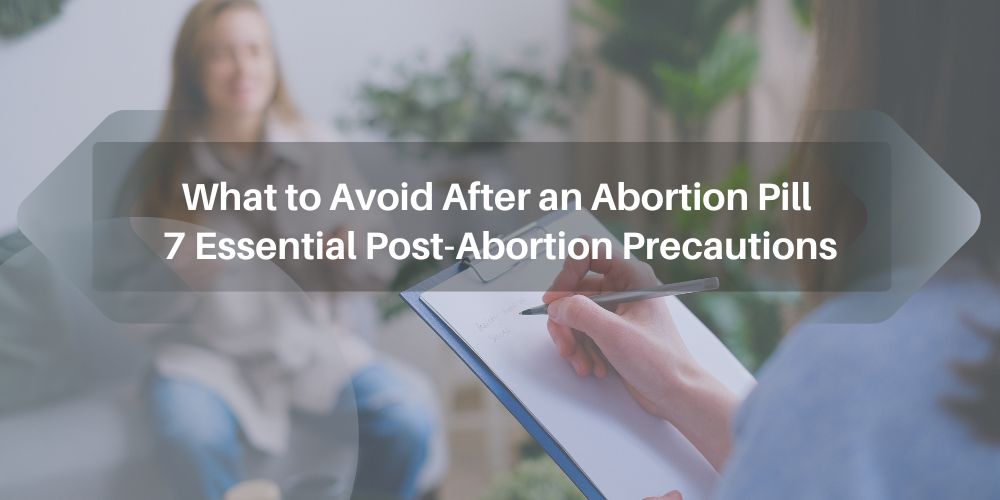Medical abortion using Mifepristone and Misoprostol is a safe and effective way to terminate an early pregnancy. But once the pills are taken, proper aftercare is critical to healing and preventing complications.
Below is a quick list of 7 important things to avoid after taking the abortion pill — followed by a full guide and answers to frequently asked questions.
7 Things to Avoid After Taking the Abortion Pill
- Avoid inserting anything into the vagina (e.g., tampons, menstrual cups, sex)
- Avoid heavy lifting or intense physical activity
- Avoid alcohol, smoking, or recreational drugs
- Avoid delaying medical care if warning signs appear
- Avoid skipping your follow-up or confirmation
- Avoid unprotected sex until you start contraception
- Avoid isolating yourself emotionally — mental health matters
Full Post-Abortion Aftercare Guide
1. Avoid Inserting Anything Into the Vagina
No tampons, douching, or vaginal sex for at least 7–14 days. Your cervix remains open after taking Misoprostol, and inserting anything can increase infection risk. Use sanitary pads instead and monitor for abnormal bleeding or odor.
2. Avoid Heavy Lifting or Strenuous Activity
Don’t do any intense exercise, lifting over 10 lbs, or high-impact workouts during the first 72 hours. Physical strain can increase bleeding or delay recovery. Gentle walking is okay — but rest is best.
3. Avoid Alcohol, Smoking, and Drugs
These substances may:
- Thin your blood (alcohol)
- Delay healing (smoking)
- Mask serious symptoms (drugs)
Instead, drink water, eat iron-rich meals (leafy greens, beans), and sleep well. Avoid anything that might impair your judgment or recovery.
4. Avoid Ignoring Severe Symptoms
Seek medical attention if you notice:
- Bleeding that soaks 2 pads per hour for over 2 hours
- Fever over 100.4°F (38°C) lasting more than 24 hours
- Foul-smelling discharge
- Intense pain unrelieved by painkillers
- No bleeding at all within 24 hours after Misoprostol
These could indicate infection, incomplete abortion, or other complications.
5. Avoid Skipping Your Follow-Up
It’s important to confirm that the abortion was complete. Options:
- Ultrasound after 1–2 weeks
- Serial blood hCG tests
- Home pregnancy test after 3–4 weeks (note: can remain positive for weeks)
If abortion was via telehealth, your provider may offer virtual check-ins.
6. Avoid Unprotected Sex — Fertility Can Return Fast
Ovulation can occur as early as 2 weeks post-abortion. If you’re not ready for another pregnancy, talk to your provider about:
- Birth control pills
- IUD
- Implant
- Condoms (also help prevent infection)
Start contraception as soon as advised.
7. Avoid Emotional Isolation
Abortion can trigger mixed emotions — relief, sadness, anxiety, or guilt. Hormonal shifts and societal stigma can worsen the emotional load.
Reach out to:
- A trusted friend or family member
- Mental health therapist
- Abortion support hotlines or groups
You’re not alone — healing includes your mind and heart, too.
FAQs: What to Avoid After Abortion Pills
Q1. Can I take a bath after a medical abortion?
Yes, warm showers are safe. However, avoid soaking in bathtubs, pools, or hot tubs for at least 7 days to reduce infection risk.
Q2. When can I use tampons again?
Use tampons only after bleeding stops and at least 7–14 days post-abortion. Pads are recommended for monitoring flow and avoiding bacteria.
Q3. When can I have sex again?
Vaginal sex should be avoided for at least 7–14 days or until your provider confirms you’re safe to resume. Early sex increases infection risk.
Q4. Will the abortion pill affect future fertility?
No. Medical abortion does not affect your ability to get pregnant in the future. Fertility returns quickly, so use birth control if you’re not planning another pregnancy.
Q5. Can I drink alcohol after taking abortion pills?
It’s best to avoid alcohol for at least 48–72 hours post-pill. Alcohol can increase bleeding and interfere with pain medications.
Final Thoughts
The abortion pill is a safe and effective way to end an early pregnancy, but post-care matters just as much as the pills themselves. By avoiding common risks — like inserting objects, skipping follow-ups, or pushing through pain — you allow your body the space to heal properly, physically and emotionally.
If you experience unusual symptoms, don’t delay in seeking professional care. Abortion is healthcare, and your well-being matters.



